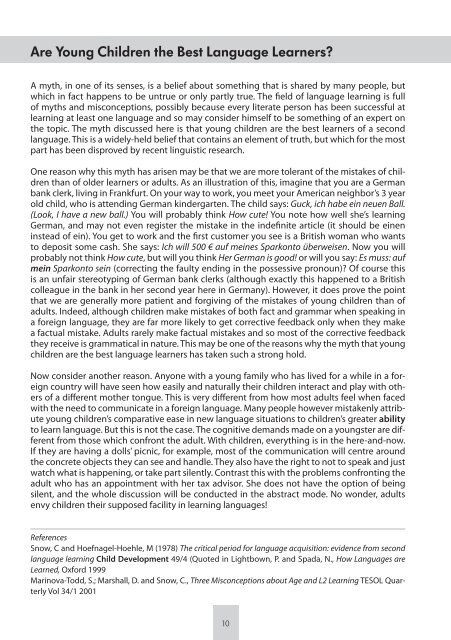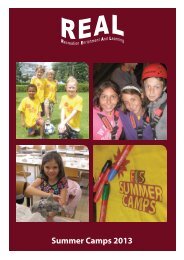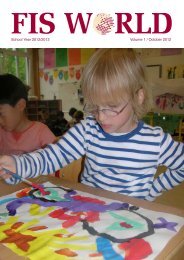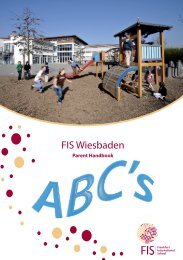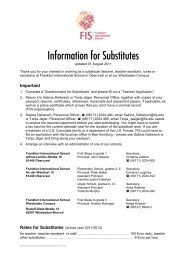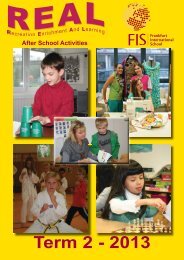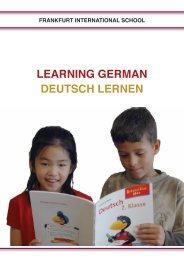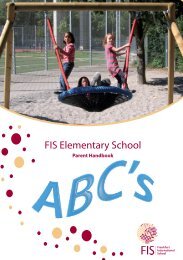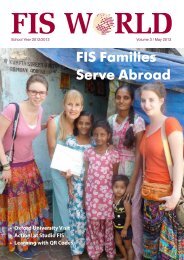English as a Second Language - Frankfurt International School
English as a Second Language - Frankfurt International School
English as a Second Language - Frankfurt International School
Create successful ePaper yourself
Turn your PDF publications into a flip-book with our unique Google optimized e-Paper software.
Are Young Children the Best <strong>Language</strong> Learners?<br />
A myth, in one of its senses, is a belief about something that is shared by many people, but<br />
which in fact happens to be untrue or only partly true. The field of language learning is full<br />
of myths and misconceptions, possibly because every literate person h<strong>as</strong> been successful at<br />
learning at le<strong>as</strong>t one language and so may consider himself to be something of an expert on<br />
the topic. The myth discussed here is that young children are the best learners of a second<br />
language. This is a widely-held belief that contains an element of truth, but which for the most<br />
part h<strong>as</strong> been disproved by recent linguistic research.<br />
One re<strong>as</strong>on why this myth h<strong>as</strong> arisen may be that we are more tolerant of the mistakes of children<br />
than of older learners or adults. As an illustration of this, imagine that you are a German<br />
bank clerk, living in <strong>Frankfurt</strong>. On your way to work, you meet your American neighbor’s 3 year<br />
old child, who is attending German kindergarten. The child says: Guck, ich habe ein neuen Ball.<br />
(Look, I have a new ball.) You will probably think How cute! You note how well she’s learning<br />
German, and may not even register the mistake in the indefinite article (it should be einen<br />
instead of ein). You get to work and the first customer you see is a British woman who wants<br />
to deposit some c<strong>as</strong>h. She says: Ich will 500 € auf meines Sparkonto überweisen. Now you will<br />
probably not think How cute, but will you think Her German is good! or will you say: Es muss: auf<br />
mein Sparkonto sein (correcting the faulty ending in the possessive pronoun)? Of course this<br />
is an unfair stereotyping of German bank clerks (although exactly this happened to a British<br />
colleague in the bank in her second year here in Germany). However, it does prove the point<br />
that we are generally more patient and forgiving of the mistakes of young children than of<br />
adults. Indeed, although children make mistakes of both fact and grammar when speaking in<br />
a foreign language, they are far more likely to get corrective feedback only when they make<br />
a factual mistake. Adults rarely make factual mistakes and so most of the corrective feedback<br />
they receive is grammatical in nature. This may be one of the re<strong>as</strong>ons why the myth that young<br />
children are the best language learners h<strong>as</strong> taken such a strong hold.<br />
Now consider another re<strong>as</strong>on. Anyone with a young family who h<strong>as</strong> lived for a while in a foreign<br />
country will have seen how e<strong>as</strong>ily and naturally their children interact and play with others<br />
of a different mother tongue. This is very different from how most adults feel when faced<br />
with the need to communicate in a foreign language. Many people however mistakenly attribute<br />
young children’s comparative e<strong>as</strong>e in new language situations to children’s greater ability<br />
to learn language. But this is not the c<strong>as</strong>e. The cognitive demands made on a youngster are different<br />
from those which confront the adult. With children, everything is in the here-and-now.<br />
If they are having a dolls’ picnic, for example, most of the communication will centre around<br />
the concrete objects they can see and handle. They also have the right to not to speak and just<br />
watch what is happening, or take part silently. Contr<strong>as</strong>t this with the problems confronting the<br />
adult who h<strong>as</strong> an appointment with her tax advisor. She does not have the option of being<br />
silent, and the whole discussion will be conducted in the abstract mode. No wonder, adults<br />
envy children their supposed facility in learning languages!<br />
References<br />
Snow, C and Hoefnagel-Hoehle, M (1978) The critical period for language acquisition: evidence from second<br />
language learning Child Development 49/4 (Quoted in Lightbown, P. and Spada, N., How <strong>Language</strong>s are<br />
Learned, Oxford 1999<br />
Marinova-Todd, S.; Marshall, D. and Snow, C., Three Misconceptions about Age and L2 Learning TESOL Quarterly<br />
Vol 34/1 2001<br />
10


